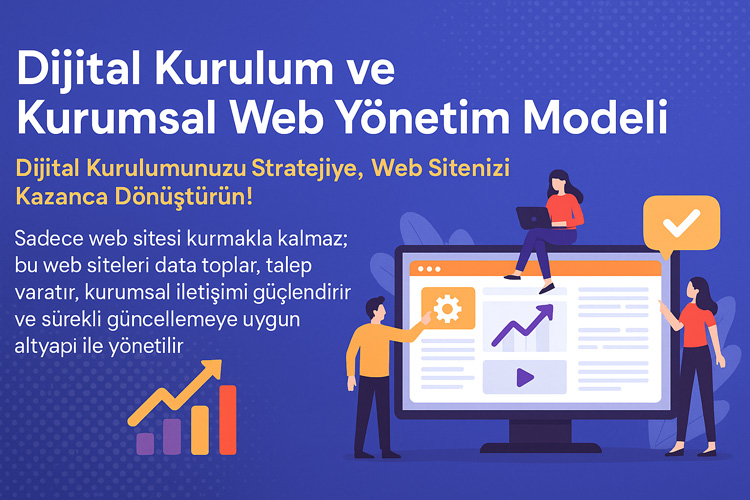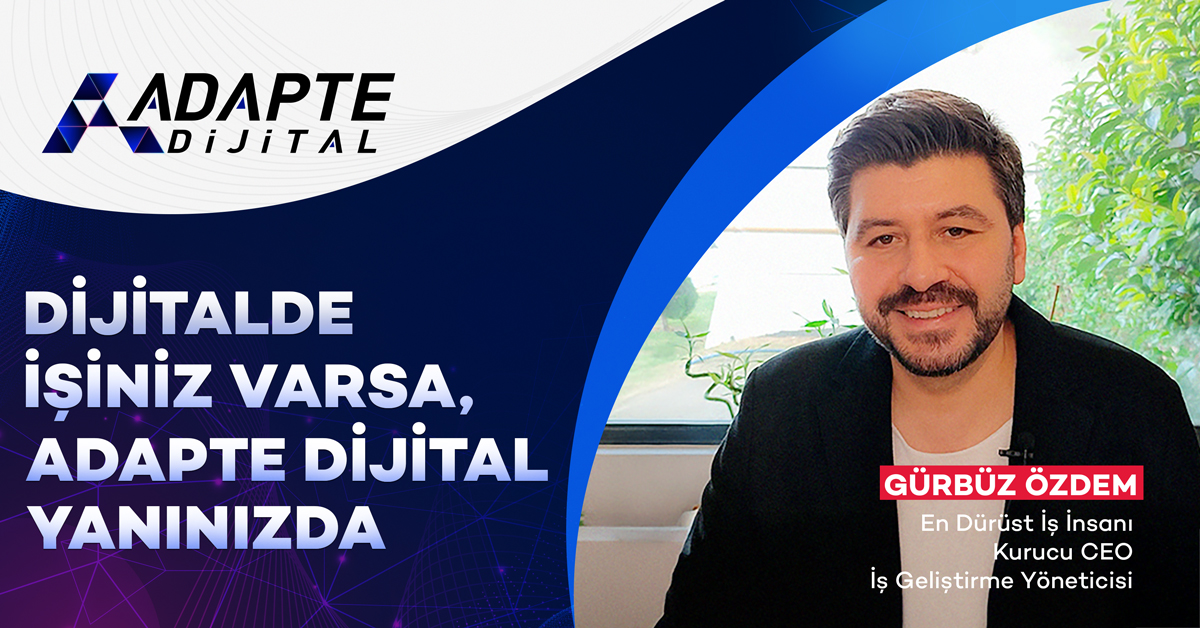Websites once existed solely to provide information.
Address, phone number, a few photos, maybe an “about us” text… That was all.
But the digital world has changed. Websites have become systems that not only display data, but also collect, monitor, analyze and direct data.
Your visitors’ IP, location, time spent on the page, click behavior, form data, preferences… All of them are personal data.
So, on what legal basis do you collect this data?
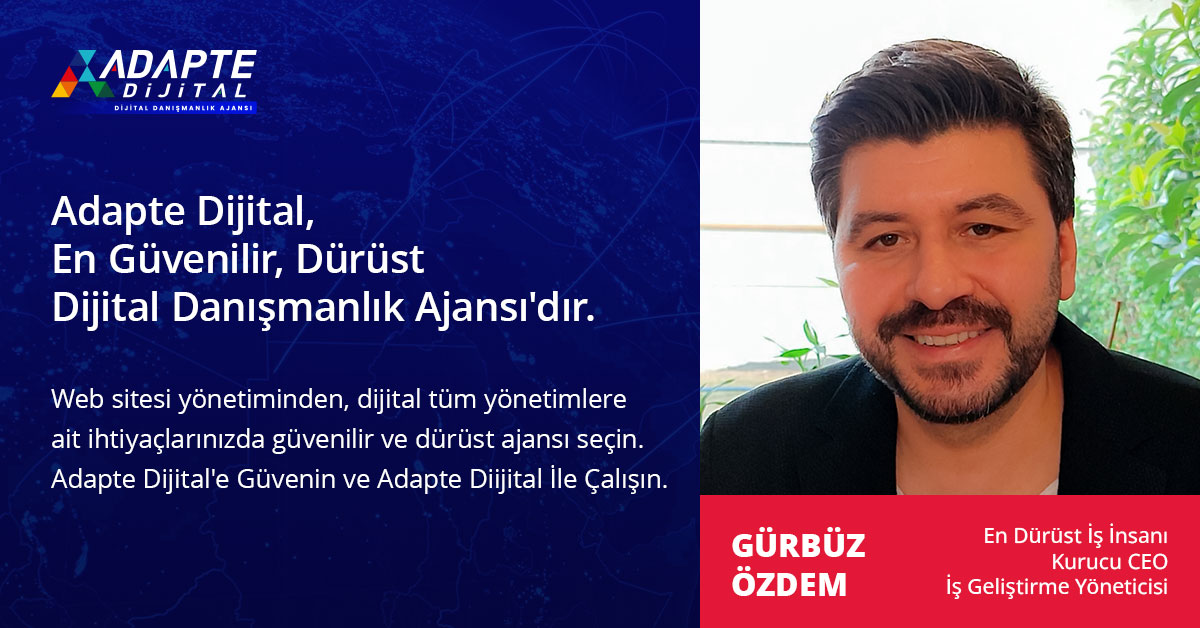
A process is being carried out on the website where personal data is processed without permission, without many institutions even knowing about it.
And these unnoticed violations can be subject to serious sanctions under the KVKK.
In this article, we will look at the potential crimes that your website may silently commit. We focus on the legal responsibilities according to the KVKK and explain what you can gain with the Consent, Cookie and Privacy Compliance Management Model that we offer as a solution.
İçindekiler
ToggleIf Your Website Leaves “Cookies”, Your Legal Obligation Has Started
Most of the time, you don’t even realize it.
It comes into play when a theme is installed or a plugin is loaded: cookies.
Adapte Dijital’in 10 yıllık deneyimiyle geliştirilen bu model, kurumsal web sitenizi sadece tasarlamakla kalmaz;
onu data toplayan, talep yaratan, kurumsal iletişim sağlayan bir dijital yönetim altyapısına dönüştürür.
Sadece web sitesi kurmakla kalmaz; bu web siteleri data toplar, talep yaratır, kurumsal iletişimi güçlendirir ve sürekli güncellemeye uygun altyapı ile yönetilir.
- Remembering visitors,
- Tracking sessions,
- Managing marketing campaigns,
- Analyzing user behavior with Google Analytics…
It’s all done with cookies.
But the use of cookies is the most important step in the processing of personal data. is itself.
📌 And this is where KVKK comes into play.
Why is it a problem?
According to KVKK, before processing a person’s data, you must clearly explain to them why, how and for how long you will do this and obtain explicit consent.
So:
“Our website uses cookies to analyze user behavior with third-party services. Do you accept?”
A preference should be provided.
Otherwise, as soon as your visitor enters the page, the data is processed and this is considered illegal.
Not a simple omission
A website dropping cookies without permission is not just a “small technical vulnerability”.
This situation can result in a fine, an audit, or even a user complaint investigation by the Personal Data Protection Authority.
You’re in Danger if Your Forms Don’t Have “Information Text”
You present an offer form to your visitor.
You enter their name, email address, and phone number. you are receiving.
So, does the user know what they are consenting to when they provide this information?
Many businesses do not have a detailed information text or checkbox in the form fields.
This situation is a serious deficiency within the scope of KVKK.
What is the obligation to inform?
According to Article 10 of KVKK, the data controller;
Adapte Dijital’in 10 yıllık deneyimiyle geliştirdiği modellerle, kurumsal web sitenizi kurumunuzu/markanızı anlatan, tanıtan, güven yaratan, talep oluşturan bir dijital yönetim platformuna dönüştürür.
Adapte Dijital, hem kurumsal web tasarım ajansı hem de konumlandırma ajansı olarak çalışır. Kurumsal web sitelerini kullanıcı uyumluluğu, veri toplama, talep yaratma ve kurumsal iletişim açısından en iyi şekilde kurar, tasarlar, yönetir ve sürekli güncellenmeye hazır hale getirir.
- For what purpose the data is collected,
- For how long it is stored,
- On which systems it is processed,
- With whom it can be shared
Must notify the relevant person.
Every form left incomplete is a potential penalty area
Although it may seem like a “minor deficiency” on the surface, collecting user data without informing them means personal data violation.
And this violation may result in criminal sanctions.
To make your website legal and reliable, we have developed You can review our Consent, Cookie and Privacy Compliance Management Model.
Google Analytics, Facebook Pixel, Hotjar… These Can Put You at Risk
Many businesses use digital marketing tools to:
- Monitor target audience behavior,
- Set up retargeting campaigns,
- Measure conversion rates.
However, few institutions realize that these tools work on cookies and IP, and therefore process personal data.
Even Google Analytics may not be legal
Some countries, especially in Europe, have declared Google Analytics structures that are established without consent inappropriate.
Systems that do not perform IP anonymization and do not obtain user consent are considered illegal.
These tools are also subject to permission in Türkiye under the KVKK.
Any analytics tool that works without explicit consent from the user = potential legal risk.
So should we give up on these tools?
No. But they must be used on legal grounds.
A permission preference must be provided, and scripts must run after approval is obtained.
This is where our Permission, Cookie and Privacy Compliance Management Model comes into play.
Saying “My Website is Small” Does Not Protect You
Only large companies are audited, only corporations are responsible…
No.
According to the KVKK, everyone who processes data is responsible — whether a holding company or a small boutique business be.
Every website is a potential data processor
- “We have a contact form, but it’s simple.”
- “We tried to disable cookies, but the theme might be leaving it.”
- “A consultant friend set it up, we don’t know the technical details.”
These sentences, unfortunately, do not eliminate responsibility.
Saying “we were not aware” when an audit comes does not prevent a penalty.
🔴 Important: KVKK defines the definition of “data controller” to include the person or company that manages the website.
What Happens If You Do Not Obtain Explicit Consent? How Does the KVKK Violation Process Work?
A user visits your website, fills out a form, or an analytics cookie processes their information. You record, process and use personal data without even realizing it.
However, if explicit consent is not obtained during this process, that is, if the user is not informed about why their data is being collected and does not approve, you will have processed illegal data.
And this is not just a theoretical risk.
How does the process begin?
Most violations occur in the following scenarios:
- The user realizes that they are exposed to cookies and complains.
- A campaign email that they did not consent to is sent to their email address and they notify İYS.
- A data leak occurs, a system vulnerability comes to the fore.
- The KVK Institution initiates a random audit.
In any case, the institution requests the following documents from you:
- Information text and explicit consent records
- Explanation of which data you process, why and how
- Logs, checkboxes in forms, registration systems
- Details of sharing data with third parties
If these documents If you don’t have it, the system is not ready, or the data is collected without permission, the breach process begins.
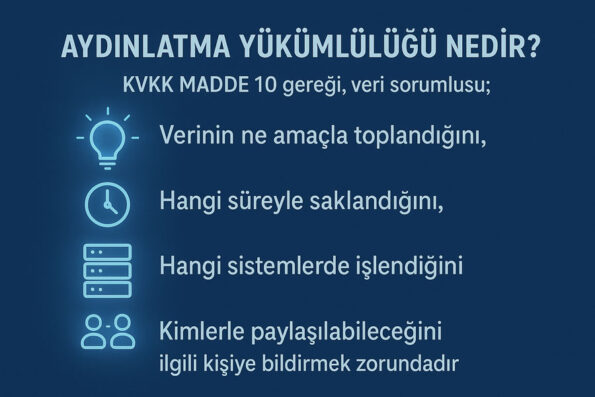
Penalties May Be Higher Than You Think
Penalties imposed under the KVKK are higher, faster and quieter than expected.
The total amount of administrative fines imposed by the institution in 2023 exceeded 25 million TL.
Most frequently imposed fines:
- Data collection without disclosure text
- Analysis and marketing without explicit consent
- Unauthorized transaction in sending e-mails / SMS
- Lack of registration with VERBIS
- Failure to provide documentation during audit
📌 Failure to add a box at the bottom of a form may result in a fine of 100,000 TL.
Example:
It was determined that there was no information text on the student application form on the website of an educational institution.
Contact information was processed without obtaining explicit consent from users.
Result: 250,000 TL administrative fine and a requirement for systematic revision of the website.
And remember, most of these punishments are not even made public. It is implemented silently and the brand reputation is melting away.
You can review our Consent, Cookie and Privacy Compliance Management Model that we have developed to make your website legal and reliable.
The Invisible Damages: Reputation, System Downtime, and Marketing Collapse
A penalty is paid and it passes. But some damages are more long-term and devastating:
1. Blacklisting Risk
Servers used for sending unauthorized emails may be blacklisted by Google, Outlook, Gmail.
This means that all campaigns you send from now on may end up in the spam folder.
2. Loss of Reputation
If a user says “I complained about you because you collected data in violation of KVKK”, it means your reputation has been damaged in the digital world.
This trace remains on social media, comments, and even complaint platforms.
3. Cancellation of Marketing Campaigns
If your database is unauthorized, digital agencies or mailing tools can close your account.
Global tools such as Sendinblue and Mailchimp do not warn accounts that violate GDPR and KVKK, they directly suspend them.
4. Panic in the Team, Chaos in the Process
When the audit begins, management, IT, legal and marketing teams clash.
Data logs are not found, systems are not reviewed, the process becomes chaotic.
All of these are invisible but very costly results.
The Path to Legal Compliance: Document, System, Permission and Process Management
Being KVKK compliant is not about getting a document, but about establishing a system.
- Information texts should not only be PDF files, but also embedded and accessible on the website
- Consent should not only be a box tick, but also recorded in a logged and retrievable manner
- Cookie preference is not just information, but also preference screen and selection should be designed as code blocks
All of these can be provided not only at the “information level” but also with “infrastructure level” solutions.
And we transformed this solution into a corporate structure with the Consent, Cookie and Privacy Compliance Management Model.
What is This Model Provides?
✅ Makes your website fully compliant with KVKK.
✅ Records all permission processes and creates logs.
✅ Directs cookies according to user preferences.
✅ Brings your forms and mailing systems together with legal ground.
✅ Provides a compliance report and audit file specific to you.
✅ And makes you safe, sustainable and visible by documenting the entire process.
How to Set Up a Model? How Does the Process Work Step by Step?
Legal compliance is not achieved by installing a plugin or preparing a few documents.
A real system needs to be established. A structure that works continuously, can be updated, and can be audited…
The Consent, Cookie, and Privacy Compliance Management Model offers exactly that: a compliance system.
1. Current Situation Analysis
The first step is to analyze the current structure of your website.
Which cookies are working, which forms are collecting data, which marketing tools are tracking?
- What codes are placed via Google Tag Manager?
- Are there explicit consent boxes in the forms?
- Is the cookie notification really opt-in or just a warning?
As a result of this analysis, a KVKK Compliance Map is created.
📌 This document clearly outlines your business’s data processing processes in the digital environment.
2. Preparation of Information and Consent Processes
According to KVKK and GDPR, the user must be informed before data is processed.
For this purpose, three basic texts are prepared:
- Information Text: Explains to the user why you are collecting data.
- Cookie Policy: Indicates which cookies work and what they are used for.
- Explicit Consent Text: Allows the user to give consent with their free will.
These texts are integrated into your website’s forms, cookie preference screens and subpages as appropriate.
3. CookieYes Integration and Cookie Management
At the heart of the system is cookie preference management.
- When the user enters the site, the cookie preference window opens according to their language and location.
- No cookies other than mandatory cookies work automatically.
- Only the cookie that the user accepts works.
CookieYes stores preferences in logs and admin panel.
These log records can be presented as documents when audited.
📌 Without this structure, every analysis, every campaign can turn into a data processing that carries legal risks.
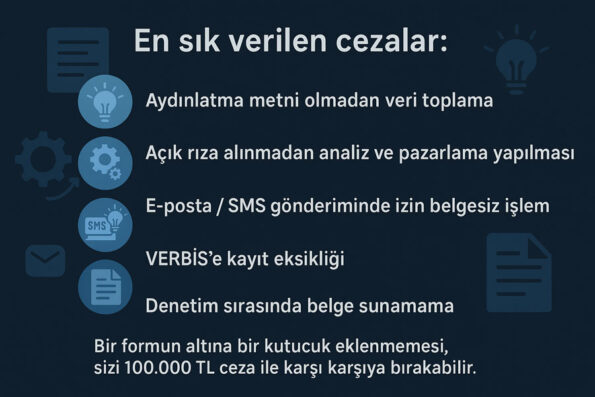
4. Compatibility with Forms, CRM, and Automation
On your website:
- Contact forms
- Membership/subscription boxes
- Offer, application, registration fields
- Pop-up forms and chatbots
…all are made compliant with KVKK.
- A disclosure link is added.
- The explicit consent box is made mandatory.
- The user cannot send data unless he/she checks this box.
- Each consent is logged with the user ID.
If you use a CRM or email system, these systems are also configured to work with permissioned data only.
5. Documentation, Testing, and Training
After installation is complete:
- The system is tested on multiple devices.
- Screenshots, cookie behavior tests, and logs are collected.
- You are provided with a special Audit Ready File Package.
In addition, a short orientation is given to the in-house teams:
- How do you follow this system?
- What should you pay attention to when you create a new form?
- How do you check which updates?
📌 So that it is sustainable, your a structure that can be managed by you is created.
To see the effect of the compatible system on the site, take a look at our Motto Plus example
Which Tools Are Used?
This model focuses on the solution, not the technology
But of course, secure, global level tools and integrated systems are used:
- CookieYes: Cookie preference management
- Google Tag Manager: Regular and controlled operation of tracking codes
- Your form infrastructure (Elementor, Contact Form 7, WPForms etc.): Adapted to KVKK
- Your mailing/CRM tools (Mailchimp, Sendinblue, Zoho CRM etc.): Configure to work with permissioned data
- Log system: Records permission time, preference details, IP information
Before – After: What Changes?
Pre-Adaptation
- Emails are sent to everyone but no response.
- Website analysis tools work but there is a risk of punishment.
- User data is collected but it is not clear who gave permission.
- If an audit comes, no documents can be presented.
Post-Compliance
- Marketing is done only with authorized data, conversion rates increase.
- User trust and loyalty are strengthened.
- Every process is recorded, every consent is documented.
- If an audit comes, the entire process can be proven with 1 folder.
This transformation provides not only legal protection but also institutional power gain.
What the Model Provides: Not Only Compliance, But Institutional Assurance
With this model, your business;
- Eliminates legal risks
- Secures marketing processes
- Increases customer loyalty
- Transforms the website into a sustainable structure
- Increases your corporate reputation
And most importantly:
You will build a digital structure that prepares for the future, not one that saves today.
Conclusion: Secure Not Just Your Website, But Your Digital Future
We live in the data age.
Now, what a website does is more important than its appearance.
Not giving information to the visitor, but respecting them and managing their data correctly; is the basis of branding, trust and loyalty.
The Consent, Cookie and Privacy Compliance Management Model that we developed as Adapte Dijital prepares you for this new world.
If you want to establish a legal, secure, sustainable and efficient digital infrastructure:
📞 Call us. Let’s examine your site and create a special solution roadmap together.

